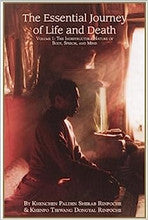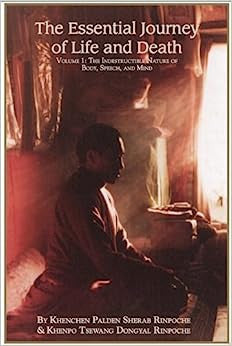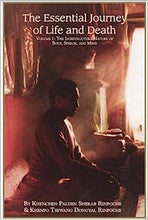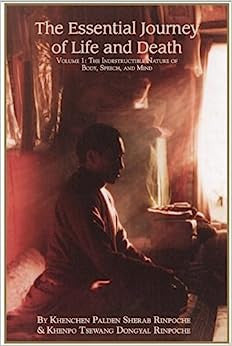Pemai Chiso
The Essential Journey of Life and Death, Volume 1
The Essential Journey of Life and Death, Volume 1
Couldn't load pickup availability
Essential Journey of Life and Death: Volume One
The Indestructible Nature of Body, Speech, and Mind
By Venerable Khenchen Palden Sherab Rinpoche
and Venerable Khenpo Tsewang Dongyal Rinpoche
Published by Dharma Samdura;
Paperback; 478 pages; 73 Photos and Illustrations;
Glossary; Includes entire practice text of “Self-Liberated Mind” by Katok Padmamati
According to the Buddha, all sentient beings are naturally enlightened and have been pure since the beginning. However, due to a small mistake, a little grasping develops into ego-clinging and a cyclic state of delusion. The bardo is the interval from the beginning of delusion until we return to our primordial nature. All our wandering in between is the bardo. The Tibetan word ‘bardo’ can be translated as “in-between place” or “intermediate state,” and the special teachings of Guru Padmasambhava describe six main bardos. However, until we reach enlightenment, everything we feel, know, and experience, is bardo phenomena. This will continue as long as we persist in clinging to the dualistic belief in the inherent existence of self and world.
The bardos don’t exist outside of us. They are the context of our experience. This is very important to understand. Don’t think that you are only in the bardo at certain times. As long as we are trapped by ego-clinging and attachment, we’re in the bardo. Even highly realized beings and great practitioners arise within this process, but they are already awake so they don’t make false distinctions between the bardo and pristine awareness. They understand that everything that appears is a display of primordial wisdom. Since we all have buddha-nature and inherent wisdom, why can’t we do as they did? We need to apply ourselves diligently and engage in our practice fearlessly.
Author: Venerable Khenchen Palden Sherab Rinpoche and Venerable Khenpo Tsewang Dongyal Rinpoche
Publisher: Dharma Samudra
Style: Paperback
Edition Print: 2012
Pages: 478
Share




